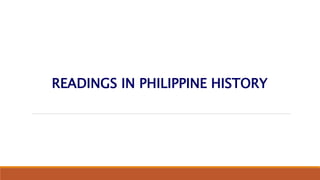
Reading in Philippine History.pptx
- 1. READINGS IN PHILIPPINE HISTORY
- 2. What is
- 3. HISTORY • a branch of knowledge that records and explains past events –MerriamWebster • the study of or a record of past events considered together, especially events of a particular period, country, or subject – Cambridge Dictionaries Online
- 4. WHY DO WE STUDY HISTORY? • To know more about the roots of our current culture. • To learn about the mistakes of those who have gone before us. • To learn about human nature in general by looking at trends that repeat through history. • To learn historical facts. • To learn about how different factors shape society e.g. religion, greed, the intersection of different cultures, technology, etc.
- 5. WHY IS HISTORY IMPORTANT? In summary, we study history to learn about who we are both our past and our present.
- 6. WHO INVESTIGATES HISTORY? Archaeologists a person who studies human history and prehistory through the excavation of sites and the analysis of artifacts and other physical remains.
- 7. WHO INVESTIGATES HISTORY? Archaeologists A person engaged in the practice of anthropology. Anthropology is the study of aspects of humans within past and present societies.
- 8. WHO INVESTIGATES HISTORY? Oral Historians Record, preserve and interpret historical information, based on the personal experiences and opinions of the source. It may take the form of eye-witness evidence about the past, but can include folklore, myths, songs and stories passed down over the years by word of mouth.
- 9. WHO INVESTIGATES HISTORY? Chemists Chemists investigate the properties of matter at the level of atoms and molecules. They measure proportions and reaction rates in order to understand unfamiliar substances and how they behave, or to create new compounds for use in a variety of practical applications. To do this they use a wide range of analytical techniques and instrumentation, including chromatography and spectroscopy.
- 10. WHO INVESTIGATES HISTORY? Linguists A linguist is someone who studies language. Linguists study every aspect of language, including vocabulary, grammar, the sound of language, and how words evolve over time.
- 11. HISTORY IS A MYSTERY TO BE SOLVED • Finding out about history is a lot like trying to solve a mystery… • You must look for clues. • You must interpret those clues • You must bring all the clues together to shed light on each other. • You must reinterpret each clue every time you find a new clue. • You must then try fill in the gaps and come to an educated
- 12. SOURCES OF HISTORY Scholars call anything that gives us a clue about history “Sources.” Sources fall into two major categories • Primary Sources • Secondary Sources.
- 13. SOURCES OF HISTORY PRIMARY SOURCES A primary source is a document or physical object which was written or created during the time under study. These sources were present during an experience or time period and offer an inside view of a particular event. • First-hand accounts of events • Artifacts • Historical documents • Memoirs • Oral histories • Newsprint
- 14. SOURCES OF HISTORY • Diaries • Poetry • Personal Interviews • Government Documents • Autobiographies • Peer-reviewed journal articles of new findings • Photographs • Video • Etc
- 15. SOURCES OF HISTORY SECONDARY SOURCES A secondary source interprets and analyzes primary sources. These sources are one or more steps removed from the event. • Textbooks • Encyclopedias • Magazine or news articles dealing with issues from the past